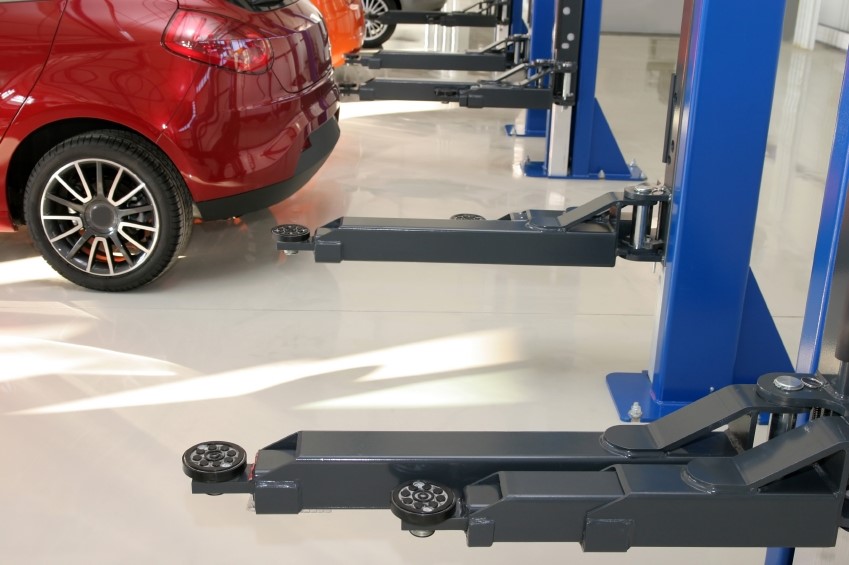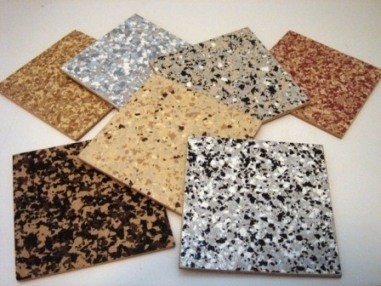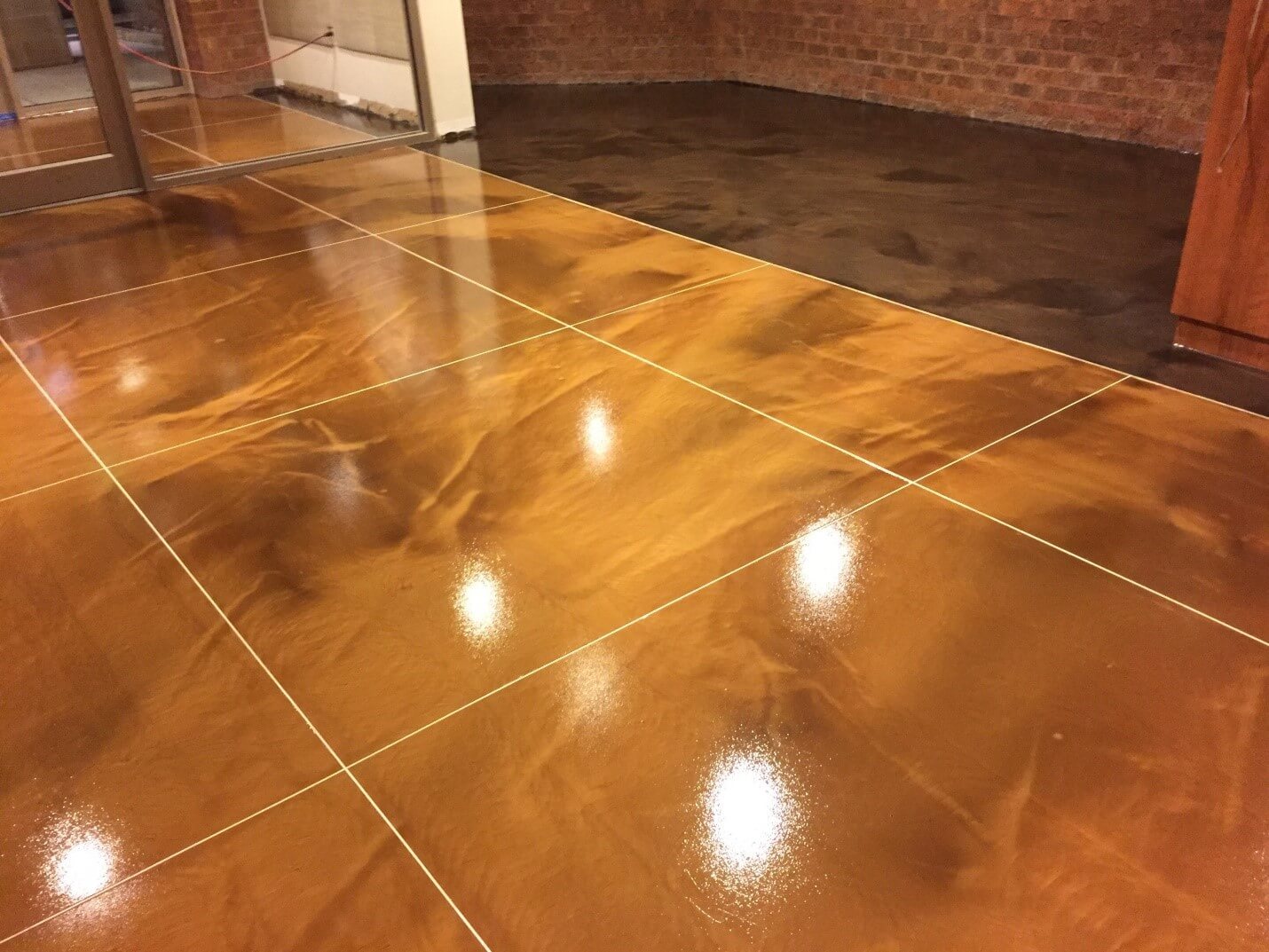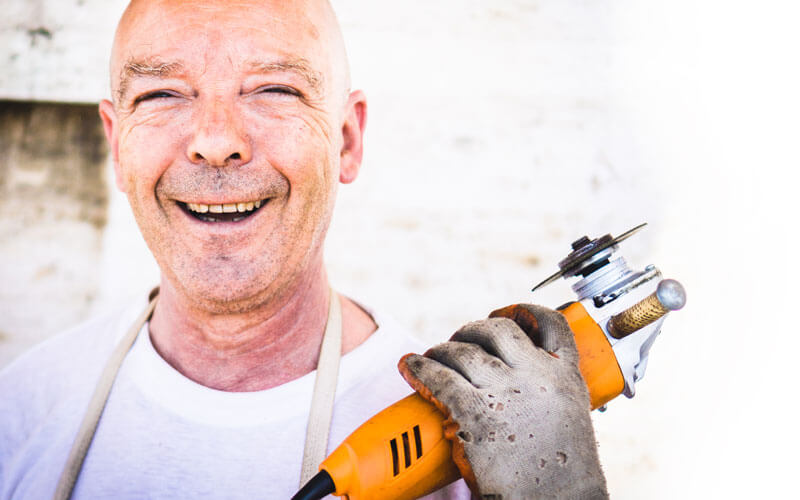Epoxy Floors Guide
MetroCrete Quick Guide to Epoxy Floor Coatings and Installation Services
Epoxy Solutions
If you’re new to the world of epoxy coatings and wondering which system is right for your use, this guide will provide you with the basics to help you choose the right coating and application services.
Epoxy floor coatings are more than a floor paint. They are engineered by chemists for a variety of uses. There are many types ranging from thin build floor paints for low traffic uses like the kits you find for the DIY applicator at most home improvement stores. Epoxy coatings are also used in tough environments in warehouses, labs and even marine decking.
Epoxies are two (2) component products including a resin and hardener. When mixed together, the chemicals cross link like a chain creating durability and adhesion to concrete and metal.



Basic Epoxy Flooring Application Services
There are epoxy application systems available for many different floor uses including restaurants, retail, showrooms, warehouse, labs, grocery stores.
Here are the basics steps for most epoxy floor coatings.
1) Surface Preparation: Surface prep is critical for proper adhesion. It generally includes floor grinding and/or shotblasting, filing cracks and fixing damaged or spalling concrete. If the floor has oil a degreaser may be needed. Its also advisable to do a moisture test to determine if there is moisture vapor pressure in the concrete. Excessive moisture vapor can cause epoxy coatings to delaminate.
2) Primer Application: The first coat applied is the primer coat. There are water based, solvent and low solvent primers. Primers are available in clear and pigmented. They can be thin mil primers of 5 to 7 mils, medium build of 6-12 mils and even high mil primers of 10 to over 40 mils thickness.
3) Build Coats: Build coats are applied to primers. Sand, colored quartz or color chips are added to wet coat. Medium build coats range from 10 to 30 mils.
4) Top Coats: Top Coats include Urethanes, Polyaspartics or clear coat epoxy.
Top Uses for Epoxy Flooring: Urethane & Polyaspartic Finishes
Residential Garages – Garage floor epoxy coatings with decorative chips and urethane or polyaspartic top coats. For ultimate design metallic epoxy coatings with a urethane. Metallic epoxy is a durable 100% solids coating with unique design. Be sure to choose systems that will withstand hot tire wear and fluids that drip such as oil and fluids.
Basement Flooring – Basement floor epoxy coatings are ideal for durability and design. Quartz, color chips and metal epoxy coatings are the most popular. Be sure to check the moisture levels coming through your concrete floor. Moisture vapor from hydrostatic pressure can cause epoxies to chip or delaminate.
Showrooms and Retail Stores – Many options are available for enhancing the curb appeal of your floor. Metallic epoxy coatings or stained concrete overlays and self-leveling cement with an epoxy or urethane protective finish provide a decorative non slip finish. Because epoxies and concrete overlays are seamless, they are easy to maintain.
Commercial Kitchens – Epoxy floor coatings for commercial kitchens need to be non-slip and withstand heat from ovens, cold from refrigeration plus constant cleaning. There are systems for virtually every requirement. Cove bases can be applied to perimeter wall areas are coated to the top edge for a true seamless, easy to maintain surface.
Warehouse – Epoxy floor coatings and mortar systems are available for a variety of uses. They can withstand forklift traffic, chemicals and moving carts and pallets.
Biological Flooring – You can choose from a variety of epoxy flooring systems for health care facilities. Systems are available for data centers, labs, loading docks, equipment cleaning rooms and more.
Food & Beverage Epoxy Floors – The food and beverage industry has a variety of unique flooring requirements that are met with specialized epoxy systems. Specialty room requirements include utility rooms, chemical containment, equipment washing, locker rooms, water and wet processing rooms.
Epoxy Coatings for Healthcare – Like the food and beverage industry, healthcare has specific needs that are met with epoxy, urethane and terrazzo flooring. These include bacterial resistant coatings for emergency rooms, pharmacy floors, bath rooms, showers and locker room floors.
Kennel Epoxy Floor Systems – One of the biggest issues is kennel cough. This is a contagious cough caused by bacteria which can get into small cracks in floors or even scratches. Polyaspartic and urethane coatings hard very hard preventing scratches. They can be maintained with application of high solids floor wax then buffed with a high speed floor burnisher. The scrub and recoat floor wax system over an epoxy floor with urethane or polyaspartic finish coat is ideal for prevention of kennel cough.



Additional Services Provided by Epoxy Coating Contractors, Installers & Painters
- Moisture Testing – Concrete Floors should be tested to determine the level of moisture vapor in the concrete slab. Excessive moisture can be mitigated with a moisture blocking epoxy if needed.
- Surface Prep – Concrete floors are either shotblasted or grinded before application of epoxy.
- Crack Repair – Cracks and expansion joints should be filled and damaged areas repaired.
- Coatings Removal – If you are removing tile, carpet or hardwood, you can have glue, mastic and adhesives grinded from the floor.
- Epoxy Repair – If your old epoxy has worn but adhesion is still strong, epoxy can be sanded and recoated.
- Concrete Sealing – if your floor has dusting or efflorescence , floors can be lightly grinded and sealed with a clear epoxy or urethane finish coat.
Types of Epoxy Floors
Water-Based Epoxy
Water based epoxy is generally thin coatings with average abrasion resistance. They have low solids in range of 40-60. They can be applied as an epoxy paint or coated with water based urethane finish coats.
High Build Epoxy
Most high build epoxy floor coatings are 90-100% solids with 10-20 mil thickness. The high build systems are frequently used in residential garages and warehouses where hot tires and abrasion resistance is needed.
Oil Stop Epoxy Coatings
Use over concrete floors with petroleum penetration.
VOC Compliant Epoxy
Frequently used as a primer coat. With thin mils of 4-7.
Moisture Cured Urethane
A one-component finish floor application over epoxy primer coats or use as finish in grind and seal stained concrete floors.
Metallic Epoxy
High Decorative, durable and thick coatings. Multiple colors can be applied to achieve the look of marble or stain concrete with a glossy polish finish.
Novalac Epoxy
Novalac epoxy is often referred to as secondary containment epoxy floor coatings. These are engineered to protect from chemical spills or tank leaks up to 72 hours. Minimum guidelines have been established by the EPA to protect the environment in case of spills. If your facility does contain hazardous materials be sure to consult with the manufacturer for the appropriate epoxy system. Decorative, durable and thick coatings. Multiple colors can be applied to achieve the look of marble or stain concrete with a glossy polish finish.
Epoxy Mortar Systems
Cove base mortar system are applied over cove bases to protect from water getting beyond the point where floors meet walls.
Freezer Epoxy mortars are applied to freezer floors and cold storage areas. There are epoxy mortars that will protect to minus zero areas for cold rooms and used for exterior patches in cold climates.
Tar Epoxy Mortar is available for repair and resurfacing asphalt areas and areas with petroleum penetration.
Skid Proof Epoxy Coatings
Skid and anti-slip epoxy provides non slip to ramps, loading docks. They can be applied to concrete and metal. base mortar system are applied over cove bases to protect from water getting beyond the point where floors meet walls.
Freezer Epoxy mortars are applied to freezer floors and cold storage areas. There are epoxy mortars that will protect to minus zero areas for cold rooms and used for exterior patches in cold climates.
Tar Epoxy Mortar is available for repair and resurfacing asphalt areas and areas with petroleum penetration.
Anti Static Epoxy Flooring
Concrete contains moisture and as a result can conduct static. If you have a facility where this may be a concern you should be aware there are primers and surface prep solutions that will be a ground preventing electrostatic charges.

We are epoxy floor experts, let us Help You
States & Cities We Service
(click on state below to see cities)
California
Colorado
Connecticut
Florida
Kentucky
New Hampshire
- Manchester
- Nashua
New Jersey
New York
- New York City
- Brooklyn
- Bronx
- Bushwick
- Elmhurst
- Jackson Heights
- Forest Hills
- Queens
- Jamaica
- Flushing
- Harlem
- Manhattan
- Levittown
- Hempstead
- Huntington
- Oyster Bay
- Islip
- Brentwood
- Smithtown
- Southampton
- Brookhaven
- New Rochelle
- Yonkers
- Mount Vernon
- White Plains
- Buffalo
- Cheektowaga
- Tonawanda
- Rochester
- Irondequoit
- Syracuse
- Albany
- Schenectady
- Utica
Oregon
Vermont
- Manchester
- Nashua